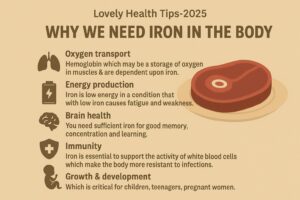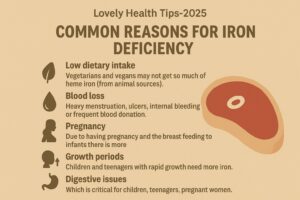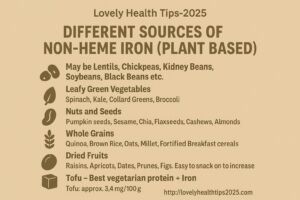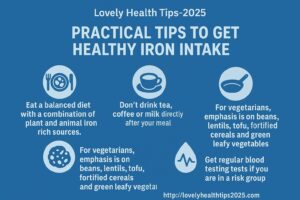Last Updated on October 21, 2025 by
Iron Supplementation – Boosting of health in right way
Introduction
Iron is one of the essential minerals in human body. It’s one of the important factors involved in the production of hemoglobin, the protein in red blood cells that enables them to transport oxygen from your lungs to the rest of your body.
Having deficient of iron, our body is not able to produce the healthy red blood cells which causes the iron-deficiency anemia. It is one of the most important factor for nutritional deficiency over the universe.
According to World Health Organization (WHO), almost 30% of the world’s population suffers from anemia and most of the cases are associated with a poor intake of iron. In this article, we will discuss everything one need to know about iron supplementation :
- Why we should give importance
- Who needs
- How much to take
- Side effects
- Natural food sources.
Iron serves a number of functions:
- Oxygen transport — Hemoglobin which may be a storage of oxygen in muscles & are dependent upon iron.
- Energy production: Iron is low energy in a condition that with low iron causes fatigue and weakness.
- Brain health: You need sufficient iron for good memory, concentration and learning.
- Immunity: Iron is essential to support the activity of white blood cells which make the body more resistant to infections.
- Growth & development: Which is critical for children, teenagers, pregnant women.

When iron levels start to drop, the oxygen supply also slows down, making you tired, your skin becomes pale, you start to feel dizzy, brittle nails occur and more frequent headaches are a normal occurrence.
Common Reasons for iron deficiency
Several reasons for iron deficiency. Iron deficiency may occur for a number of reasons:
- Low dietary intake — Vegetarians and vegans may not get so much of heme iron (from animal sources).
- Blood loss — Heavy menstruation, ulcers, internal bleeding or frequent blood donation.
- Pregnancy — Due to having pregnancy and the breast feeding to infants there is more demand of iron.
- Growth periods — Children and teenagers with rapid growth need more iron.
- Digestive issues — With pathological conditions such as celiac disease, or gastric bypass surgery, the absorption is reduced.

Understanding the cause is important because sometimes all supplementation may address the symptom like the restlessness or fatigue-rather than getting to the root of the problem.
Who needs an Iron Supplementation?
Not everyone needs supplements. But the following groups often benefit from extra iron:
- Pregnant women: Daily iron is often prescribed by the Doctors for preventing anemia and aid the fetus’s development.
- Women with heavy menstrual bleeding: To replace the loss of blood.
- Infants and children: In particular premature babies.
- Teenagers: Rapid growth and subsequent increase in the demand for iron.
- Athletes: Endurance training requires the breakdown of red blood cells and an increase in iron requirement to substitute them.
- Vegetarians and vegans: Plant-based iron (non-heme) is less able to be absorbed than animal-based iron.
- People with chronic illnesses: Such as kidney illness or a type of cancer to which anemia is not uncommon.
Always talk with a healthcare provider before you start taking iron supplements because taking iron when it is not needed is harmful.
Types of Iron Supplement
There are several forms of iron supplements. The most common include:
- Ferrous Sulfate : Most widely prescribed. Affordable and effective. May cause upset stomach or constipation.
- Ferrous Gluconate : Gentler on the stomach. Slightly reduced amount of the iron per tablet.
- Ferrous Fumarate : High iron content. Often would be recommended for severe deficiency.
- Heme Iron : Polypeptide Derived from animal sources. Better absorption, more expensive.
- Liquid Iron : Supplements useful to children or people with a problem with tablets.

Take iron with vitamin C (orange juice, etc.) to increase absorption rate- tea, coffee and calcium inhibit iron absorption. Doctors may prescribe doses for severe anemia.
Warning: Do not try to treat any of these with high doses of iron on your own because excess iron damages organs.
Side effects & risks of Iron Supplementation:
Common side effects include:
- Constipation or diarrhea
- Nausea and vomiting
- Dark stools
- Abdominal pain
Serious risks of excess iron:
- Iron overload : Can exacerbate the liver, heart and pancreas.
- Oxidative stress: Free iron in excess may cause cell damage.
- Interference with any other mineral : Iron may reduce the absorption of zinc or copper.
To minimize side effects:
- Take supplements with food (don’t with tea/coffee)
- Start with a lesser dose and work up.
Natural Food Sources of Iron:
There are two forms of iron in food:
- Heme Iron : It is an animal based food. It is then absorbed more efficiently.
- Non-Heme Iron : Present in plant based food items. Absorption is lower (2 to 20%), but it’s better when combined with food rich in vitamin C.
In biology, heme is a porphyrin ring with an iron atom at the center that is essential for producing various proteins.
Examples —different Heme Iron Sources which is Animal Based
- Red meat — Organ meats. These foods have the most bioavailable form of iron: Red Meat (Beef, Lamb, Goat). It is one of the richest sources of heme iron.
- Poultry (Chicken, Turkey, Duck) — Doesn’t have as much iron as red meat but can still contribute a lot of iron.
- Seafood (Sardines, Tuna, Salmon, Mackerel, Shellfish like Oysters & Clams) : Again Oysters are the richest sources, at around 8mg per 100g.
- Organ Meats (Liver, Kidney, Heart) : Extremely high in iron
Note: Red meat and organ meats are also great so consume them in moderation because of the cholesterol and saturated fats content.
Different sources of Non-Heme Iron which is Plant Based:
These are very important for vegetarians and vegans:
- May be Lentils, Chickpeas, Kidney Beans, Soybeans, Black Beans etc.
- Leafy Green Vegetables (Spinach, Kale, Collard Greens, Broccoli) : Spinach, spinach is in a class by itself at approx 2.7 mg per 100g
- Nuts and Seeds (Pumpkin Seeds, Sesame, Chia, Flaxseeds, Cashews, Almonds) : Pumpkin seeds are especially high, as well, with approx 4.2 mg per 28 g serving.
- Whole Grains (May be Quinoa, Brown Rice, Oats, Millet, Fortified Breakfast Cereals etc.)
- Dried Fruits (Raisins, Apricots, Dates, Prunes, Figs): Easy to snack on to increase the amount of iron consumed naturally.
- Tofu — Best vegetarian protein + Iron (tofu : approx 3.4 mg /100 g)

How to provide more iron in the body
Plant-based iron is more difficult to absorb, but there are ways to maximize absorption with astute food combinations. To increase absorption we may intake with vitamin-C rich foods”
Examples: Squeeze the juice of a lemon on spinach, try pairing beans and tomatoes or fruit with fortified cereal.
Note : Tea, coffee, wine and calcium rich foods (milk, cheese) inhibit iron absorption. Have them at least 1–2 hours away from your iron rich meal.
Cook in Cast-Iron Cookware : Increases iron content in the food (especially acidic foods such as tomato curry).
Iron-Rich Meal Combinations:
- Lentil soup + lemon juice + bread whole grains.
- Spinach aalad and orange slices with pumpkin seeds
- Oats with raisins, dates and fortified almond milk.
- Grilled chicken + broccoli (sauteed) + quinoa.
Practical tips to get healthy iron intake:
- Eat a balanced diet with a combination of plant and animal iron rich sources.
- Don’t drink tea, coffee or milk directly after your meal.
- Cook in cast-iron pans — This boosts the iron intake of food.
- For vegetarians, emphasis is on beans, lentils, tofu, fortified cereals and green leafy vegetables.
- Get regular blood testing tests if you are in a risk group.

When to talk a Doctor:
Don’t begin iron supplements without testing your Hemoglobin levels. Consult your doctor if you:
- Feel extremely tired or weak.
- Have pale skin or brittle nails or unusual hair loss.
- Have frequent dizziness or shortness of breath
- Take note of irregular heart rhythm or chest pain.
- A simple blood test (serum ferritin or hemoglobin) will confirm whether you are deficient and help determine treatment.
Concluding Points:
For example, iron supplementation can be life changing for people suffering from anemia and chronic fatigue. While deficient intake leads to serious health problems, when consumed in excess it can be dangerous.
If you suspect that you’re experiencing low iron, please don’t ignore the symptoms. Consult the doctor & take the right steps to get your health back.
Reference from WHO : https://iris.who.int/bitstream/handle/10665/204761/9789241510196_eng.pdf
Thanks and Regards.
About the Author – “Mr. Bibhu Ranjan Mund”, Master in Public Health (MPH) from IIHMR University, Jaipur (Rajasthan) has experience of 18 years in Public Health activities. Through “Lovely Health Tips-2025”, we share the evidence & experienced based health & wellness guides with solutions for every day well-being. More from Author
Disclaimer
This information is suggestive only and not a replacement for medical advice. For more detail, please visit to my website as mentioned below:

